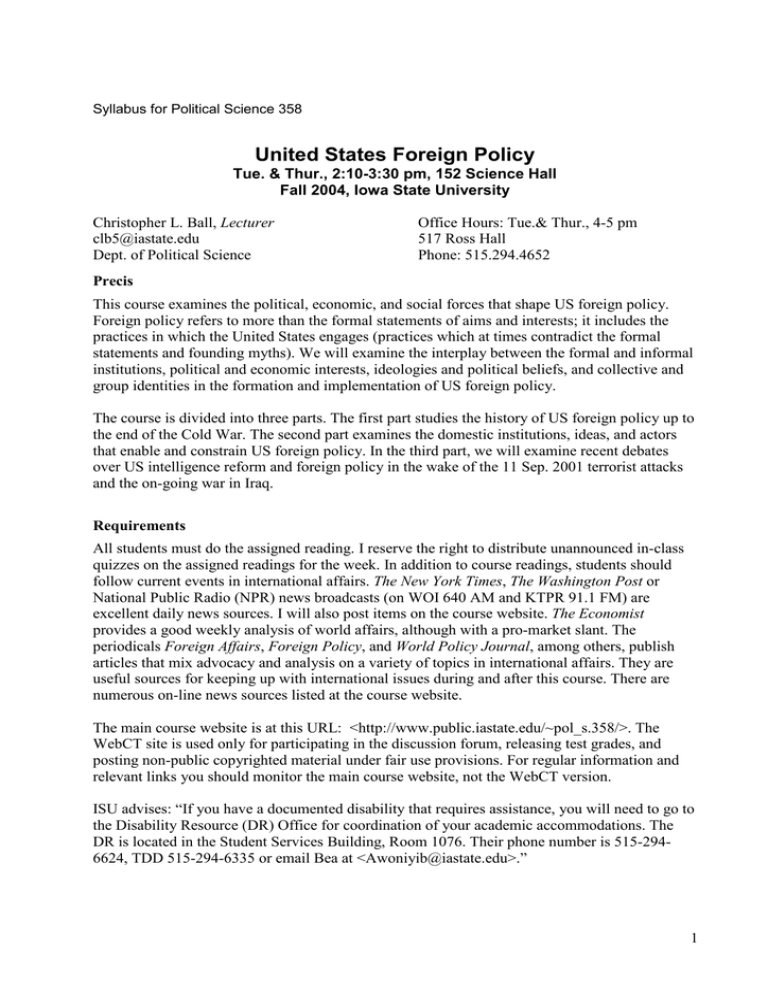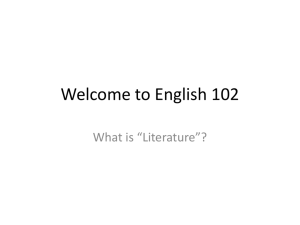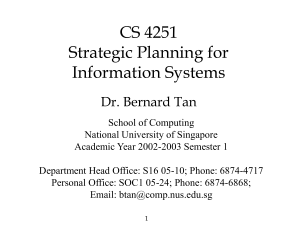
Syllabus for Political Science 358
United States Foreign Policy
Tue. & Thur., 2:10-3:30 pm, 152 Science Hall
Fall 2004, Iowa State University
Christopher L. Ball, Lecturer
clb5@iastate.edu
Dept. of Political Science
Office Hours: Tue.& Thur., 4-5 pm
517 Ross Hall
Phone: 515.294.4652
Precis
This course examines the political, economic, and social forces that shape US foreign policy.
Foreign policy refers to more than the formal statements of aims and interests; it includes the
practices in which the United States engages (practices which at times contradict the formal
statements and founding myths). We will examine the interplay between the formal and informal
institutions, political and economic interests, ideologies and political beliefs, and collective and
group identities in the formation and implementation of US foreign policy.
The course is divided into three parts. The first part studies the history of US foreign policy up to
the end of the Cold War. The second part examines the domestic institutions, ideas, and actors
that enable and constrain US foreign policy. In the third part, we will examine recent debates
over US intelligence reform and foreign policy in the wake of the 11 Sep. 2001 terrorist attacks
and the on-going war in Iraq.
Requirements
All students must do the assigned reading. I reserve the right to distribute unannounced in-class
quizzes on the assigned readings for the week. In addition to course readings, students should
follow current events in international affairs. The New York Times, The Washington Post or
National Public Radio (NPR) news broadcasts (on WOI 640 AM and KTPR 91.1 FM) are
excellent daily news sources. I will also post items on the course website. The Economist
provides a good weekly analysis of world affairs, although with a pro-market slant. The
periodicals Foreign Affairs, Foreign Policy, and World Policy Journal, among others, publish
articles that mix advocacy and analysis on a variety of topics in international affairs. They are
useful sources for keeping up with international issues during and after this course. There are
numerous on-line news sources listed at the course website.
The main course website is at this URL: <http://www.public.iastate.edu/~pol_s.358/>. The
WebCT site is used only for participating in the discussion forum, releasing test grades, and
posting non-public copyrighted material under fair use provisions. For regular information and
relevant links you should monitor the main course website, not the WebCT version.
ISU advises: “If you have a documented disability that requires assistance, you will need to go to
the Disability Resource (DR) Office for coordination of your academic accommodations. The
DR is located in the Student Services Building, Room 1076. Their phone number is 515-2946624, TDD 515-294-6335 or email Bea at <Awoniyib@iastate.edu>.”
1
Syllabus for Political Science 358
Class Participation: All students should be prepared to participate in class discussions and in
the on-line discussion via WebCT. Class participation on the WebCT discussion forum is worth
10% of the course grade. Each student has a C as his or her default grade. If students participate
well, their grades will be increased. Students who fail to participate or who do so poorly will get
a C.
Students are not expected to perform Periclean orations, but everyone should be prepared to
discuss the assigned readings, current events, and questions that I pose. Criticisms of points
made in readings, by fellow students, and by yours truly are welcome, and debates may emerge
among students. Students should respect their classmates’ contributions, and refrain from
partisan or parochial philippics. The purpose of these discussions is not to win imaginary
debating points, but to learn beyond solitary reading and unexamined listening.
Debates: In addition, there are three in-class debates on 28 Sep., 28 Oct., and 7 Dec. Students
will be randomly assigned to a specific role in one debate. Students will defend or criticize a
topic I issue based on information from readings and lectures. Debate performance is worth 20%
of the course grade.
In-Class Tests: There will be two in-class, multiple-choice tests on lectures and readings. The
first will be on 5 Oct. and the second on 9 Nov. Each counts for 20% of the course grade.
Final Exam: There will be a multiple-choice final exam at the date and time determined by the
Registrar. It is worth 30% of the course grade.
Penalties: Students must submit take-home assignments on time and sit at the designated inclass tests. Students may not ‘make-up’ tests or papers at will. There are two exceptions. First,
for personal emergencies (e.g., a death in the family, medical problems), students should obtain a
note from the dean of students. Second, for students with extra-curricular activities that conflict
with in-class tests, arrangements for an alternate date and time must be made at least a week in
advance. The student must provide verification of the activity in order to be eligible for an
alternate test appointment. I do not accept notification after the fact (e.g., “I didn’t turn in my
paper last week because I had a match”).
A computer mishap will not excuse a late paper. You should make frequent and multiple backups of your work (to at least 2 separate floppy disks or other removable media), so that you never
lose more than one hour’s worth of work. If you own your own computer, be sure you
familiarize yourself with the ISU’s computer labs in case your system breaks down.
Grade Components
Your final grade will be calculated as follows:
• Participation: 10%
• Debate: 20%
• Tests: 40% (20% each)
• Final Exam: 30%
2
Syllabus for Political Science 358
Each component will be assigned a letter grade, converted to a grade point, and multiplied by its
percentage weighting. I do not accept make-up assignments, re-writing of papers, or extra-credit
work.
Academic Honesty
Iowa State University regulations regarding academic honesty will be enforced. See Iowa State
University Catalog, “Academic Dishonesty,” p.38-39. The penalty for plagiarism or cheating on
tests or exams is failure for the course.
Readings
There are three books available for purchase for this course at University Bookstore (294.5684)
in the Memorial Union and the Campus Bookstore (292.1616), 2300 Lincoln Way.):
1. Walter A. McDougall, Promised Land, Crusader State: The American Encounter with the
World Since 1776 (New York: Mariner Books, 1997) PLCS
2. Patrick Callahan, Logics of American Foreign Policy: Theories of America’s World Role
(New York: Pearson Longman, 2004) LOGIC
3. Eugene R. Wittkopf and James M. McCormick, eds., The Domestic Sources of American
Foreign Policy, 4th edition (New York: Rowman & Littlefield, 2004) DOMSO
A boldface abbreviation after a book is substituted for the title in the syllabus. The books are also
available on reserve at Parks Library.
______________________________________________________________________________
24 Aug.
Introduction
26 & 31 Aug. (No Class 2 Sep.)
From Founding to Great Power Status
McDougall, chaps. 1-5 (pp.15-121) PLCS
7 & 9 Sep.
America and World Wars
McDougall, chaps. 6-7 (p.122-171) PLCS
14 & 16 Sep.
The Cold War
Callahan, Chap.1-6 (p.1-110) LOGIC
3
Syllabus for Political Science 358
21 & 23 Sep.
The Cold War (cont’d)
McDougall, chap.8 & Conclusion (p.147-224) PLCS
Callahan, chap. 7-8 (p.113-142) LOGIC
James C. Thomson Jr., “How Could Vietnam Happen? An Autopsy” in DOMSO
28 & 30 Sep. (Debate #1 on 28 Sep.)
The Political Theory of Foreign Policy
The Federalist Papers #64, 69, 75 at http://lcweb2.loc.gov/const/fed/fedpapers.html
US Constitution, Articles I:7-10; II:2-3, III:2, VI at http://lcweb2.loc.gov/const/
constquery.html
5 & 7 Oct. (Test #1 on 5 Oct.)
The Presidency
Michael Nelson, “Person and Office: Presidents, the Presidency, and Foreign Policy” in
DOMSO
Thomas Preston and Margaret G. Hermann, “Presidential Leadership Style and the Foreign
Policy Advisory Process” in DOMSO
Miroslav Nincic, “Elections and U.S. Foreign Policy” in DOMSO
12 & 14 Oct.
Executive Bureaucracy
Ivo H. Daalder and I.M. Destler, “How National Security Advisers See Their Role” in
DOMSO
Eliot Cohen, “A Tale of Two Secretaries” in DOMSO
Staff Statement #17: Improvising a Homeland Defense, National Commission on Terrorist
Attacks Upon the United States via < http://www.911commission.gov/hearings/hearing12/staff_statement_17.pdf>
Ivo H. Daalder and I.M. Destler, “Advisors, Czars, and Councils” in DOMSO
19 & 21 Oct.
Congress
Louis Fisher, “Presidential Wars” in DOMSO
James A. Lindsay, “From Deference to Activism and Back Again: Congress and the Politics
of American Foreign Policy” in DOMSO
James Goldgeier, “NATO Expansion: The Anatomy of a Decision” in DOMSO
Bruce Stokes and Pat Choate, “Trade Policy Making: the Changing Context” in DOMSO
26 & 28 Oct. (Debate #2 on 28 Oct.)
Social and Economic Lobbies
Philip Brenner, et al., “Intermestic Interests and U.S. Policy Toward Cuba” in DOMSO
Jon Western, “Sources of Humanitarian Intervention: Beliefs, Information, and Advocacy in
U.S. Decisions on Somalia and Bosnia” in DOMSO
4
Syllabus for Political Science 358
2 & 4 Nov.
Public Opinion
Shoon Kathleen Murray and Christopher Spinosa, “The Post-9/11 Shift in Public Opinion:
How Long Will it Last?” in DOMSO
Peter D. Feaver and Richard H. Kohn, “The Gap: Soldiers, Civilians, and their Mutual
Misunderstanding” in DOMSO
9 & 11 Nov. (Test #2 on 9 Nov.)
Intelligence
Pollack, “Spies, Lies, and Weapons: What Went Wrong.” The Atlantic Monthly
(January/February 2004) via WebCT
“Iraq Weapons of Mass Destruction Intelligence in Secretary Powell's United Nation's
Speech,” Report on the U.S. Intelligence Community's Prewar Assessments on Iraq,
Senate Select Committee on Intelligence at <
http://a257.g.akamaitech.net/7/257/2422/13jul20041400/www.gpoaccess.gov/serials
et/creports/pdf/s108-301/sec7.pdf>
16 & 17 Nov.
Intelligence Reform
Richard K. Betts, “Fixing Intelligence,” Foreign Affairs 81:1 (Jan./Feb. 2002), pp.43-59 via
WebCT
John Deutch & Jeffrey H. Smith, “Smarter Intelligence” in DOMSO
Thanksgiving Recess
30 Nov. & 1 Dec.
Pre 9-11, Redux
Staff Statements #5-8, National Commission on Terrorist Attacks Upon the United States at
< http://www.9-11commission.gov/staff_statements.htm>
7 & 9 Dec. (Debate # 3 on 7 Dec.)
Conclusions
Final Exam
Tentatively, 14 Dec.,12:00-2:00 p.m
5




